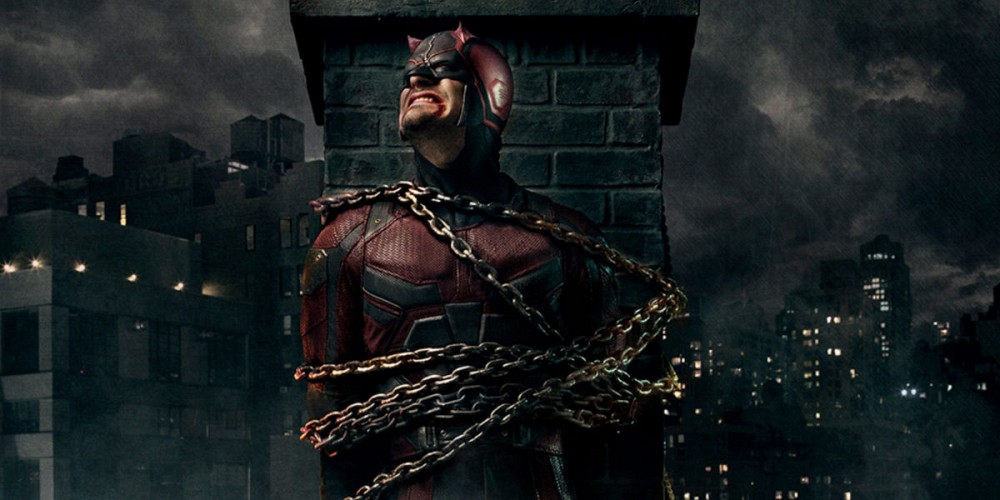
News
Summers Will Not Finish Semester of Teaching as Harvard Investigates Epstein Ties

News
Harvard College Students Report Favoring Divestment from Israel in HUA Survey

News
‘He Should Resign’: Harvard Undergrads Take Hard Line Against Summers Over Epstein Scandal

News
Harvard To Launch New Investigation Into Epstein’s Ties to Summers, Other University Affiliates

News
Harvard Students To Vote on Divestment From Israel in Inaugural HUA Election Survey
‘Daredevil’ Devout and Two-Dimensional
The second season of Marvel's “Daredevil” has been released on Netflix, once more bringing blind justice to slightly-too-aptly-named Hell's Kitchen, New York. Hell's Kitchen in 2016 is thoroughly hip—not nearly as seedy as the series makes it out to be—but its name, at least, plays perfectly with the show's overtly and somewhat oddly religious overtones. Rarely do our superheroes come in the form of semi-martyred blind Catholics masquerading as the "Devil" in "Hell" these days, but Netflix's TV show took its cues from Frank Miller's 1980's “Daredevil” comic book series “Man without Fear,” which defined the superhero in large part by his connection to religion (one story arc was even entitled “Born Again”).
“Daredevil” is the story of Catholic defense attorney Matt Murdock, whom a tragic accident at the age of nine deprived of sight but also endowed with a superhuman heightening of all other senses. He learned to fight from his father, a poverty-stricken professional boxer who was paid to lose matches, and has now grown up to be the embodiment of blind justice in a red leather uniform and a pair of improbable devil's horns nobody, presumably, really takes seriously. Actor Charlie Cox's Murdock is suave but approachable and excels in extended bouts of hand-to-hand combat with up to a dozen trained killers. He cries thinking about his father, never kills people, and is altogether saintly: In the course of persuading the Punisher, a murderous fellow vigilante who has gone off the deep end, that he is in the wrong, he even seems to attempt to bring the man, a Catholic, back into the faith. In one particularly sermon-like speech, he asks the Punisher, "You never stop and think, 'Shit, I just killed a human being?’ A human being who had one small piece of goodness in 'im? Maybe just a scrap, but something. And then you come along and that one small flicker of light gets snuffed out forever…. You think God made you a one-man firing squad. But you're wrong. There is goodness in people, even in you."
The combination of the series' gritty and often gruesome style—darker than that of most Marvel creations—with this type of painfully melodramatic writing and overtly religious message can be jarring. We are graced with shots of the saintly Murdock and others crudely stitching together their own wounds or beating each other extensively at close range. One particularly charming shot displayed a few teeth, still attached to the gum (and nothing else), buried in the side of a table—original owner nowhere to be found. The aesthetic of Daredevil's dangerous Hell's Kitchen and the cinematography from Martin Ahlgren (of House of Cards) are equally dark: The color palette is largely deep blacks and reds to match Daredevil's uniform, and camera shots don't cut from one dynamic picture to the next, as one might expect from a Marvel creation, but stay in close range, circling the action and not allowing the viewer to miss anything ugly.
Whereas Daredevil himself and his sidekicks—a pudgy, hapless goofball (Elden Henson) and an unreasonably attractive damsel in distress-turned-daring female crime-fighter (Deborah Ann Woll)—can seem like the flat comic-book caricatures they are, the minor characters in the series, emerging from the show's bleak setting, stand out as frankly human and even occasionally realistic. These residents of the fictitiously gruesome Hell's Kitchen ground the series in reality and prevent it from veering off entirely into the world of sermonizing superheroes in technicolor. But perhaps this is merely because they don't speak enough to be flattened by Doug Petrie and Marco Ramirez' scripting into two dimensions.
Want to keep up with breaking news? Subscribe to our email newsletter.

